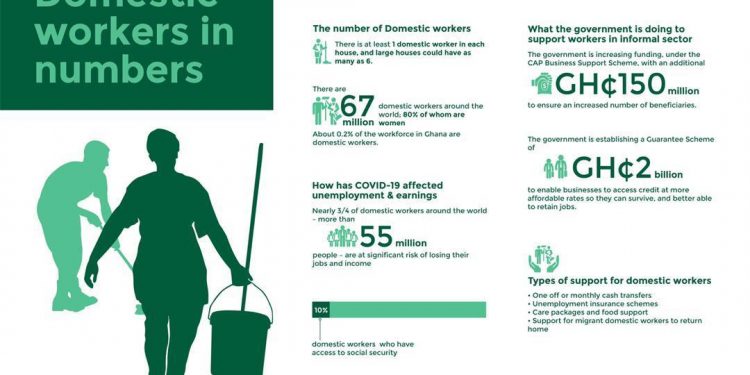Many organizations have laid-off workers with others slashing salaries of their workers due to the adverse effect COVID 19 has had on businesses.
Most of these persons we have heard of or know are captured and fall within the formal sector. But there are many others, who provide critical roles usually in private homes and offices who have lost their jobs; Domestic Workers.
Although there are provisions in the Labour Act,2003 for domestic workers, there are no clear rules and guidelines for them here in Ghana.
They are classified under live-in or live-out domestic workers. Live-in domestic workers are those who reside in the house where they perform their work while live-out workers live outside their place of work.
They are categorized within the informal sector of the economy and many of them lack any explicit labour and employment legislation
The International Labour Organization stipulates that there are 67 million domestic workers around the world; 80 percent of whom are women.
A significant number of this number, that is 55 million according to the ILO are likely to lose their job. That notwithstanding, 37 million of affected numbers are women.
Considering the role women play in homes and contributing to the economy, these numbers are huge and if strategies are not put in place to aid them, this becomes a difficult task and the burden on the society as a whole will be felt drastically.
Although there is no readily available data on the number of domestic workers, their numbers are believed to be in the tens of thousands.
I meet up Sarah Akweley Yemoh in La, a Ga community in the Greater Region of Ghana, who has been a domestic worker for over 17 years.
She used to work in two different households prior to the COVID 19 pandemic and gained a monthly income of 400 cedis.
She breaks down after a few minutes of trying to keep up a brave face. She says the last few months since the lockdown was implemented have been extremely tough for her. To Aunty Sarah, the lockdown has been a “shutdown.’
“It is shut down because of the impact it has on my livelihood. It has been difficult. I went to work and they asked me to return when the country is COVID free. If someone calls me to wash for them, I’m willing to do it because there is nothing to survive on,” she says.
The majority of families, especially within the urban centres, rely on domestic workers to clean their homes and other household chores.
However, with the onset of COVID 19, many employers have had to part ways with their domestic workers because they no longer need their services since they and their children are at home but also because employers no longer want to receive them in their homes because of isolation measures.
For many domestic workers who live from hand to mouth, this loss has had a big impact with many of them unable to pay rent and therefore facing the risk of evictions and homelessness.
Some of the live-in workers also risk not being allowed to take their off-days due to the social and physical distance requirements while others are afraid to demand full payment or even more pay for the additional work caused by the lockdown.
Since many of them work without formal contracts, terminating them is easy and those who remain in employment are more cautious in demanding their rights as they fear losing their jobs.
At the onset of the pandemic, the Domestic Workers Union which was established in 2015 to look into the welfare of domestic workers, issued a statement asking the government to intervene and give them assistance.
The union asked the government to provide some of the resources set aside for economic recovery to go to informal workers, particularly domestic and home-based care workers.
At the same time, the union appealed to the government to ratify and adopt the ILO Convention 189 on Decent Work for Domestic Workers which sets out the rights and protections for domestic workers.
Eva Akakpo, the president of the Ghana Domestic Workers Union which currently has 2,000 members is now distraught.
She has had to cough up money from her own pocket to support some of her members who are in dire need.
In early April, the International Domestic Workers Federation set up a USD2 million Solidarity fund to provide domestic workers with among others, protective gear, hygienic products so that they can continue working; give out food and a little cash to members in critical condition.
The federation was giving grants of between USD5,000 – USD10,000 to its affiliates in different countries.
At least 48 governments have instituted measures targeted at alleviating the impact of Covid19 on the informal sector.
These involve a one-off or a three-month cash transfer to those who are unemployed or are unregistered in the government’s social security or grants program.
Only Spain has introduced specific measures targeting domestic workers. This follows aggressive lobbying by SEDOAC, an association that fights for the labour, civil, political, and social rights of all domestic workers in Spain.
The income security policy instituted would ensure that domestic workers were paid 70 % of their wages, a benefit equivalent to unemployment insurance.
On July 26, President Nana Addo Dankwa Akufo-Addo announced the establishment of a National Unemployment Insurance Scheme to provide temporary income to those who have lost their jobs due to the COVID-19 pandemic. “Once approved by Parliament, a National Unemployment Insurance Scheme will be instituted and will provide temporary income support to workers that have lost their jobs.
The government is increasing funding, under the CAP Business Support Scheme, with an additional one hundred and fifty million cedis (GH¢150 million), to ensure an increased number of beneficiaries,” he said at the time.
However, for people like Nii Odartey, a gardener who lost his job in March, the promise of an unemployment insurance scheme is just a pipe dream. Odartey, like Aunty Sarah, is now dependent on family members and friends to sustain him.
“ People don’t know if you have COVID or not and most of them are of the impression that you have it so it’s best for you to stay at home. I’m not working now. I stay at home and nothing is really going on. No money, Nothing. If you don’t have any relative that is going to support you, then that is it!” he says.
Domestic workers are needed now more than ever as most are at home and the work that comes with it. However, the self-isolation measures many employers have adopted make it difficult for the live-out domestic workers to continue with their jobs. Those who live in have experienced additional workload and especially where they are also expected to take on home-based care for those who may be unwell or the aged, who are at more risk.
Domestic workers across the globe have been affected by the pandemic. In June 2017, the government banned the issuance of visas to Ghanaian domestic workers working in the Gulf states following widespread reports of mistreatment and abuse.
However, despite the ban, Ghanian nationals, the majority of them women, have continued to travel to these countries for work. Since the pandemic broke out, private individuals and the government has spent numerous resources to help these women return home.
The first ever multi-dimensional survey on poverty indicated that two out of every five Ghanaians are poor those living below the; using multi-dimensional poverty parameters.
Unless the cash transfers and unemployment insurance scheme kicks in immediately, domestic workers like Aunty Sarah will slide into the category of the extremely poor and swell the numbers of those living in desperate circumstances.
–
The writer Zoe Abu- Baidoo is a fellow of the African Women Journalism Project. The fellowship is an initiative with support from the International Centre for Journalists (ICFJ).














